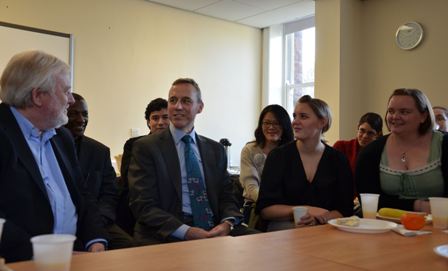UK Chief Veterinary Officer (CVO), Nigel Gibbens visited the University’s Leahurst campus to take part in a mock animal disease outbreak exercise, and deliver a talk about his role.
Nigel spent the day with Veterinary Science MSc students, for whom a semester is devoted to learning not just about the microbiology and epidemiology of disease control, but also how to respond to media and public concern about such outbreaks.
This year the students are investigating a plague scenario, imported to the UK through household pets. They trace the source of the outbreak to ensure human and animal health is maintained, and write ‘dummy’ press releases for distribution.
The University’s Press team, based in Corporate Communications, then runs media training for the participants, allowing them to carry out mock TV and radio interviews to brief the public.
Nigel played himself in a morning of exercises during which the students briefed him on their investigation so far, and he quizzed them about their plans for controlling the ‘outbreak’.
Nigel, CVO since 2008, then delivered a talk where he discussed his role in managing outbreaks, including the current Schmallenberg virus epidemic, and the important role Government plays in maintaining animal welfare across the UK’s vital agriculture industry.
Nigel, who has previously worked in Government veterinary services in Belize and Yemen, told the students: “Once we take an animal out of the wild and use it, we are compromising their welfare. The question is, to what degree is that compromise acceptable to society? The answer is; to a large degree in the world we live in. That brings society some degree of discomfort so we have a framework of regulation struck to set a baseline, which is what society says animals should expect from us should we mess with them.”
Professor Malcolm Bennett, Director of the MSc programme, said: “The students, as part of this course, are taking part in a real time disease outbreak exercise. In real life they would be answerable to the Chief Vet, so it’s great that Nigel was not only willing to give a talk but actually take part in the exercise.”
The students also heard from Ellesmere Port and Neston MP Andrew Miller, Chair of the Commons Select Committee on Science and Technology. Andrew described the role of scientific evidence in policy and how select committees work, before discussing the need for scientists and politicians to interact more.
